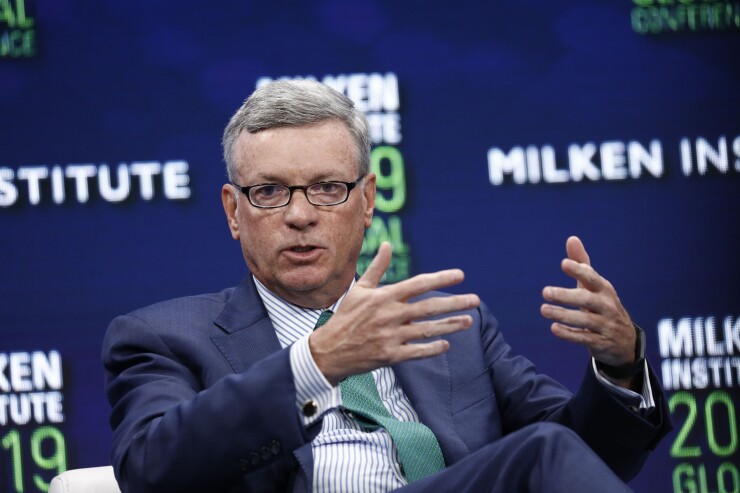Even in a struggling economy, widespread mobile phone adoption is fueling a boost in financial technology investment in Africa, a market where Visa is getting more aggressive.
"Africa is in the midst of a massive digital transformation," Visa CEO Alfred Kelly said during this week's U.S.-Africa Business Forum in Washington. "Africa is central to Visa's growth ambitions."
Visa this week said it would invest $1 billion in Africa over the next five years, using the funds to build up its operations in Africa and deepen collaboration with governments, financial institutions, mobile network operators, fintechs and merchants. Payments firms are investing in Africa, attracted by the opportunity to improve financial inclusion.
"We facilitate millions of transactions in Africa every day," said Kelly, adding Visa is active in all of Africa's 54 countries. "This has given us firsthand knowledge of the pace of economic development and the promise of the future."

Visa will use the $1 billion investment to help build the payment ecosystem in Africa. It will also support the digitization of economies and development of local fintech talent. Visa recently established local operations in the Democratic Republic of Condo, Ethiopia and Sudan. The card brand also opened a Sub-Saharan Africa Innovation Studio in Nairobi, Kenya, in an effort to attract clients and partners to develop payment and digital commerce products.
Visa's other moves include introducing Tap to Phone, which allows smartphones to accept contactless payments without requiring added hardware to attach to the phone, such as a card reader. Tap to Phone is growing in Europe and the U.S., getting a boost from
"Tap on Phone will remove a major barrier to acceptance," Kelly said.
Visa is additionally focused on bridging the local gender gap through She's Next, a program that provides funding, mentoring and networking opportunities for women entrepreneurs in Egypt, Kenya, Morocco and South Africa.
"Financial inclusion is a key topic for the card networks, and Visa has a history of investing in new technology, partnerships and alliances in Africa," said Nathan Hilt, managing director and payments and fintech solutions lead at Protiviti.
Like most companies that bring financial services to Africa, Visa will rely heavily on smartphones, given the continent's general lack of a traditional financial network of bank branches and traditional points of sale. Mobile operators, such as
While smartphone shipments in Africa have
"That number was nearly nonexistent five years ago," he said.
Africa's overall digital economy is about $115 billion, but it's expected to grow more than 600% by 2050, according to the research firm
Internet penetration in Africa has doubled in the past eight years to 28%, according to GSMA, adding that percentage should continue to grow as access becomes less expensive.
As a result of growing mobile adoption with a lot of upside from people who still do not have access, Africa is attracting more funding to boost financial technology. Technology investments in Africa are expected to pass $10 billion by 2025, up from around $3 billion in 2021 and less than $250 million in 2015, according to
Other payments companies are also investing in Africa.
PayU, a Hoofddorp, Netherlands-based payments company, recently expanded in Ghana and South Africa, adding scan to pay and expanding buy now pay/later lending in Africa. And the Chicago-based identity technology company Keyo and authentication company PalmKash this week announced development of a biometric-based identity network in Africa.
"There are still a lot of places in the world where the card networks have not really penetrated as [in] the U.S., U.K, or Europe," said Mario Shiliaski, CEO of PayU Global. "That's where fintech companies can come in and drive change in local markets."
AZA and other payments companies such as WorldRemit are expanding their services in anticipation that local startups in underserved areas will require better digital payment options when doing business in other markets in and outside of Africa.
"In many respects, Africa has been a leader in P2P mobile payments, and there are a significant number of customers and small to medium-sized businesses that are digital natives and comfortable with mobile forms of payments," Hilt said.






